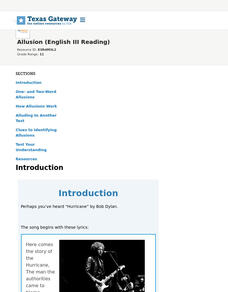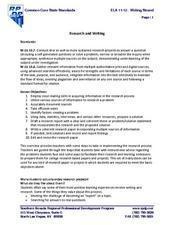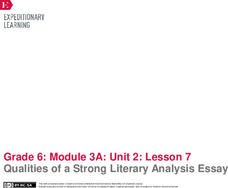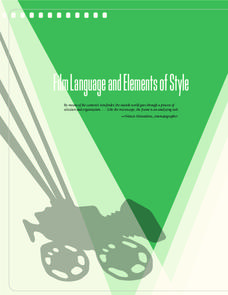Texas Education Agency (TEA)
Allusion (English III Reading)
An interactive lesson introduces readers to allusions, the literary device writers use to add depth to their work. Users record notes on the provided graphic organizer as they identify the allusions in poems by Walt Whitman, Langston...
Southern Nevada Regional Professional Development Program
Researching and Writing
Designed for teachers, this resource identifies problems learners face when attempting a research project and approaches instructors can use to help their class members overcome these obstacles. Suggestions are included for how to help...
Curated OER
Nonfiction Genre Mini-Unit: Persuasive Writing
Should primary graders have their own computers? Should animals be kept in captivity? Young writers learn how to develop and support a claim in this short unit on persuasive writing.
EngageNY
Qualities of a Strong Literary Analysis Essay
Read like a writer. Scholars read a model literary analysis in preparation for a similar writing assignment before annotating each paragraph for the gist. Next, pupils devise a list of qualities of a strong literary analysis essay.
EngageNY
Writing to Inform: Analyzing a Model Using a Rubric
Learn to write right. Scholars analyze the model essay Adversity Faced by Townspeople in the Middle Ages. They discuss the essay and make annotations working with an elbow partner. Learners then take another look at the essay using a...
PBS
Stories of Painkiller Addiction: Learning About Opioids
Feeling high is not the only side effect of abusing prescription opioids. Middle and high schoolers learn more about specific painkillers, including Fentanyl, Oxycodone, and Clonazepam, as well as their common brand names and extensive...
Institute of Electrical and Electronics Engineers
Get it Write
In an effort to practice engineering design, STEM classes break out into teams and endeavor to make a working ink pen. To prepare, they read about writing implements through history, patents, and viscosity of liquids. Armed with this...
Federal Reserve Bank
Ben Franklin: Highlighting the Printer
By studying Benjamin Franklin's work as a printer, your class will have a fantastic opportunity to learn about the economic concepts of entrepreneurship, human capital, and investment.
Channel Islands Film
Santa Cruz Island - Visible Thinking Routines
Visible Thinking Routines are designed to help learners deepen their understanding of what they are learning and enable them to communicate their understanding of concepts to others. Individuals adopt one of these routines to use to...
Mr. Beem's Social Studies
Civil Rights Project: The Long Civil Rights Movement
Investigate milestones along the path that lead to the American Civil Rights Movement of the 1960s. After researching key people, events, court cases, and legislative orders, teams present their findings as a magazine, newspaper, or...
School Improvement in Maryland
Dividing the Powers of Government
Who does what? To develop an understanding of the balance of power between the US federal and state governments, class members research responsibilities in terms of legal systems, security issues, economic activities, lawmaking, and...
Polk County Public Schools
Suffragists
The Women's Rights movement is the focus of an engaging and collaborative exercise, in which young historians use information found in textbooks, class notes, and the provided documents to craft a DBQ essay.
History with Peters
A Clear Signal for Change: Multiple Interpretations and Nat Turner’s Rebellion
Was Nat Turner a hero or a violent criminal? Using primary sources and images that discuss the rebellion of enslaved people he led in antebellum Virginia, scholars consider the question. Then, they create memorials to Turner and...
Walters Art Museum
The Symbolism of Allegorical Art
Introduce learners to allegorical art with four bronze sculptures by Francesco Bertos. After modeling how to recognize bias and allegory in Bertos' Africa, class groups examine the other three sculptures in the series before creating...
Film Foundation
Film Language and Elements of Style
How do you read a frame? How do you read a shot? Here's a resource that shows viewers how to read films. As part of the study, class members examine the camera angles, lighting, movement, and cinematic point of view in Mr. Smith Goes to...
Kenan
Respiratory System
Explore the respiratory system with a model. First, pupils build a set of lungs to experiment how they inflate and deflate. Then, they delve deeper into the topic with a web quest to discover new information about the nose, trachea, and...
Curated OER
Mini-Lesson Planning for Inferences
Making inferences and drawing conclusions is a key component to successful active reading. Encourage your class to use context clues and prior knowledge to infer different elements of a story, including the setting, plot, and character...
World Intellectual Property Organization
Learn from the Past, Create the Future: Inventions and Patents
3D printers, selfie sticks, smart watches. GPS, self-driving cars, YouTube. Imagine life without inventions. Believe it or not, these items were all invented in the last 10 years. Inventions, and the inventors responsible for them, are...
EngageNY
Planning for Writing: Introduction and Conclusion of a Literary Analysis Essay
First and last impressions are important. Using the helpful resource, scholars draft the introductory and concluding paragraphs of their literary analysis essays. Next, they use a writing evaluation rubric to self-assess their work.
Columbus City Schools
Poetry Speaking and Listening Standards
Celebrate April's National Poetry Month or enrich a poetry unit with a wealth of language arts material. Class members develop an oral interpretation of a poem and/or develop a podcast interview with a poet.
EngageNY
Revision and Illustration: Strengthening the Writing in my Rainforest Field Journal and Adding a Labeled Drawing
Let me draw you a picture. Scholars read a quote from Roger Tory Peterson and discuss his views on drawings. They then create their own drawings of an ant or butterfly to add to their science journals.
iCivics
For The President, All In A Day's Work
How does the president of the United States get the authority to exercise his/her duties? What responsibilities and tasks go into a hard day's work for the president? Here is a lesson plan that includes several instructional materials...
EduGAINs
Governmental Apology for the Aboriginal Experience—Canadian and World Studies
What constitutes an effective apology? After considering a series of scenarios, class members develop criteria for an effective apology and then use these indicators to evaluate Canada's Prime Minister Harper's apology to former...
iCivics
Drafting Board: Military Intervention
Should countries use their militaries to stop humanitarian crises in other countries? Learners make claims, organize their reasoning, and provide evidence for their arguments with this rich resource.

























